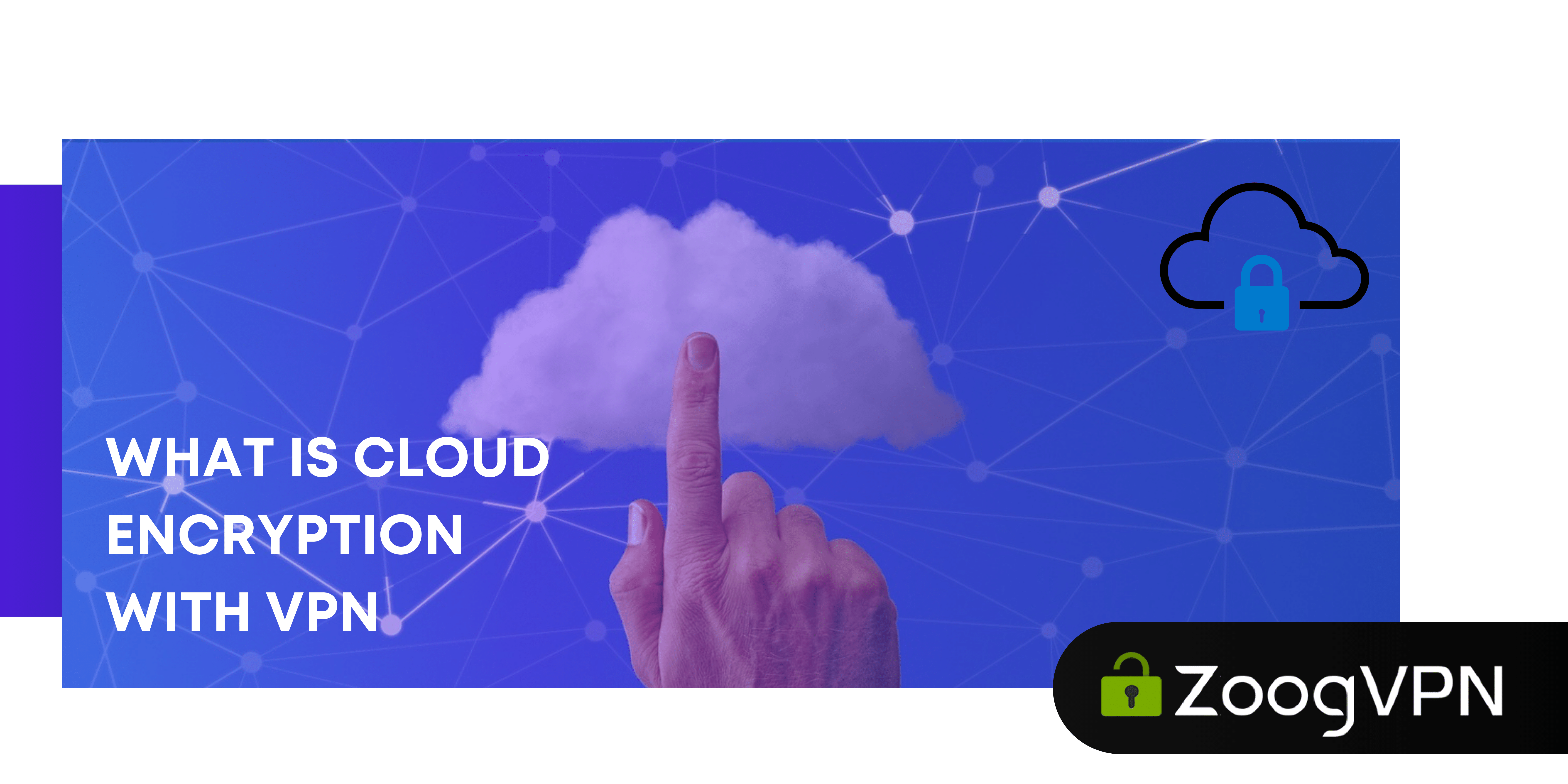Cloud-based services have come in wide use for many individuals as a convenient way to store their data. Still, with this convenience come concerns about data security and privacy. According to a recent survey, 80% of companies reported experiencing at least one cloud security incident in the past year, with 27% of organizations facing a public cloud security incident — an increase of 10% compared to last year. Cloud encryption coupled with VPN can become a go-to solution to create a highly protected space for your information.
Cloud encryption implies encoding data stored in the cloud, turning it into unreadable ciphertext, thus making it inaccessible to unauthorized users. VPNs, in turn, create secure, encrypted connections over the internet, shielding users’ online activities from prying eyes. Together, they form a formidable defense against cyber threats, ensuring data confidentiality and integrity.
What is cloud encryption with VPN services? Why is their synergy essential for you to secure your data? Let’s find out together!
The Significance of Cloud Security
With the wide use of cloud-based services, securing data stored there has become a critical consideration. The significance lies in safeguarding sensitive information from unauthorized access, data breaches, and cyber threats. Cloud environments are susceptible to various risks and vulnerabilities, such as hacker attacks, insider threats, insecure APIs, and misconfigurations. Weak cloud protection can lead to severe consequences, like personal data breaches and exposure of sensitive information such as financial details, personal documents, and private communications. As a result, this can lead to identity theft, financial fraud, and loss of individual privacy. Unauthorized access to private files, photos, and other digital assets can cause data loss and, of course, emotional distress for users.
Robust encryption efficiently handles these risks by guaranteeing that data remains encrypted both in transit and at rest. By encrypting sensitive information, you can add an advanced layer of protection to your storage, making it significantly harder for hackers to access and exploit the data. A cloud with strong encryption protocols and access controls reliably provides the confidentiality, integrity, and availability of data placed in your cloud.
Understanding VPNs and Encryption
VPNs, short for Virtual Private Networks, establish secure, encrypted connections over the internet, providing solid security to your personal data. Through VPNs, data is encapsulated within a secure tunnel, eliminating unauthorized access or interception. VPNs employ various encryption protocols like IKEv2, WireGuard, and OpenVPN to ensure protected data transmission. These protocols implement sophisticated encryption algorithms to scramble data, making it indecipherable to anyone without the decryption key. By encrypting data, VPNs ensure privacy and security when accessing cloud services. This makes your online activities safe from interception or monitoring by hackers, ISPs, or government agencies. With a reliable VPN vendor, you can be sure that your sensitive information, like login credentials, financial transactions, and chat messages, is highly secured. VPN encryption thus acts as a powerful assistance for your cloud storage encryption, boosting your data against potential cyber threats and guaranteeing confidentiality in the digital world.
How VPNs Enhance Cloud Security
VPNs support cloud security by encrypting data transfers between users and cloud servers. Data ciphering ensures that the data is incomprehensible even if intercepted during transmission, making sensitive information safe in the cloud or when transmitted from your device. VPNs and cloud encryption establish a protected channel to prevent potential leaks and man-in-the-middle attacks.
Besides, VPNs deliver extra protection against cyber threats targeting cloud-based services. You can effectively hide your IP address in two clicks, so malicious actors can’t track or infiltrate cloud environments. These factors make VPNs a vital element in maximizing the security of cloud computing encryption so you can use your space with no worries.

Benefits of Using VPNs for Cloud Encryption
Let’s sum up the use of VPNs for cloud data encryption and why you should consider using such a service today.
Improved Data Privacy
As mentioned, VPN encryption serves as an intermediary for your cloud storage and device, preventing ISPs and other third parties from accessing or tracking data transmitted to and from cloud servers. Without a VPN, data packets can be intercepted and analyzed, compromising the privacy of sensitive information you store in the cloud.
Enhanced Security For Public Wi-Fi
Attackers can gain access to your data traffic even quicker in case your information travels between your device and the cloud server within public Wi-Fi networks. This is where the risk of interception and unauthorized access is the highest. Robust encryption protocols and authentication mechanisms eliminate unauthorized users when you upload or download your data from the cloud within a weak security network.
Geo-Bypassing Restrictions
Another use case of a VPN for cloud encryption is the ability to handle geo-restrictions established by cloud providers. Some vendors limit access based on the user’s geographical location, restricting certain content or services. A VPN can equip you with a wide choice of servers placed in different regions or countries, allowing you to mask your IP address and appear as if you are accessing the cloud service from permitted whereabouts. In case you need to access specific cloud storage, and the service provider is restricted in your geo position, you can turn on your VPN and circumvent these limitations. Therefore, you are free to access the cloud from anywhere in the world. This may especially come in use if you work in a global team, obtaining seamless collaboration and productivity without being hindered by the set restrictions.
Considerations When Choosing a VPN for Cloud Encryption
When choosing a VPN for cloud encryption, failure resistance, stability, and performance are the primary factors you should keep in mind. Opt for a provider with a track record of reliable servers and fast connection speeds to ensure seamless data transfer and minimal downtime. Strong encryption standards are equally crucial; select VPNs using powerful protocols like IKEv2, WireGuard, and OpenVPN to save your cloud data from potential breaches or unauthorized access. Needless to say, your VPN provider should be compatible with your cloud platform and services. Prioritize a VPN that offers a balance of reliability, strong encryption, and support with your chosen cloud services to protect your sensitive data effectively.
At ZoogVPN, we know how to boost your cloud security. Our service offers bank-level encryption, liquidating any unauthorized access. Your privacy and confidentiality are our top priority, so we adopt a strict no-logs policy, allowing you to keep your online activities anonymous. With the leading encryption protocols, you can be sure that your data is protected when in transmission, making your cloud usage experience absolutely flawless and maximum secure. Sign up for a ZoogVPN today.
Implementing VPNs for Cloud Encryption
Here’s a brief guide on implementing a VPN for cloud encryption to make the process straightforward for you.
Step 1: Choose a VPN Service
- Select a reliable VPN service. Use the factors we’ve discussed earlier.
Step 2: Sign Up and Download the VPN
- Sign up. Go to the VPN provider’s website and create an account to access its services.
- Download. Install the VPN solution for your device. The prevalent part of VPNs supports multiple platforms so you can use the VPN on any operating system.
Step 3: Install and Configure the VPN
- Login. Once downloaded, open the VPN app and log in with the account credentials you created.
- Configure the VPN settings.
- Select a server location that caters to your needs (you may consider regions nearby for better performance);
- Activate any additional security features like Kill Switch, Split Tunneling, Advanced Leak Protection, and the Shadow protocol (when using ZoogVPN).
- Connect to the chosen server. Click the ‘Connect’ button in the VPN app to establish a secure connection to the selected server.
- Verify. After the connection, verify your IP address to ensure it has changed, indicating that the VPN is active.
Step 5: Choose an Encrypted Cloud Storage Service
Select an encrypted cloud storage service. Some popular options are as follows:
- Sync
- Mega
- pCloud
Step 6: Sign Up and Configure Cloud Storage
- Sign up. Go to the cloud encrypted storage provider’s website and register for an account.
- Download and install. Download the cloud storage application and install it on your device.
- Login. Log in to the cloud storage application with your account details.
Step 8: Accessing Encrypted Files with VPN
- Ensure the VPN is connected. Make sure your VPN is connected before accessing your cloud storage.
- Access files. Open the cloud storage application and access your files. The VPN ensures your connection is secure, and the cloud service ensures your files remain encrypted.
Tips for Enhanced Security
The primary suggestion you should stick to is regular updates, as they are crucial for enhanced security. Always keep your VPN and cloud storage applications updated to the latest versions. This ensures that you benefit from the latest security patches and improvements. Besides, create strong and unique passwords for your cloud storage accounts to make it impossible to guess your password or hack it. Long and strong passwords cut down the risk of unauthorized access. Furthermore, don’t neglect enabling Two-Factor Authentication (2FA), which adds an extra layer of security to your accounts, making it significantly harder for attackers to gain access even if they have your password.
Conclusion
The use of a VPN is a reliable measure of ensuring security within cloud encryption environments. Through robust encryption protocols, VPNs eliminate external access and interception, even when you use weakly secured networks.
Cyber threats of cloud storage occur regularly, and VPNs serve as an essential tool in mitigating risks and safeguarding against malicious activities. Therefore, we highly suggest adopting VPN technologies as a proactive way to save your valuable data housed in cloud-based services. Boost the security of your encrypted cloud by signing up for ZoogVPN, your trusted vendor delivering maximum protection and privacy.



























